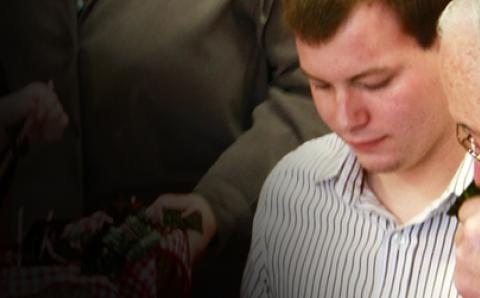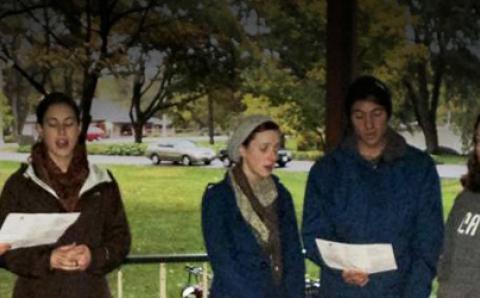The Christian Reformed Church recognizes that there is near consensus by scientists that climate change poses a significant threat to the planet and to future generations, and that it is likely due to human activity.
Rev. Nick Overduin, Classis Toronto: “We don’t want to fiddle while creation burns.”
Photo: Karen Huttenga
Synod 2012 called for churches, members, and denominational agencies to be voices for creation stewardship in reducing our individual and collective carbon emissions into the atmosphere.
But reaching that conclusion was not by any means a short order.
The report of the Creation Stewardship task force to synod sparked several hours of spirited discussion and debate. From the accuracy of the science involved to the church’s responsibility in addressing the issue, delegates sparred back and forth in what was expected to be a contentious matter even before Synod 2012 began.
When it ended, though, delegates had decided that the issue of climate change was one the church can no longer afford to ignore.
“We don’t want to fiddle while creation burns,” said Rev. Nick Overduin, Classis Toronto, who chaired the creation stewardship advisory committee.
Delegates who supported the report warned that if the CRC and its membership failed to act, it would be ignoring the threat of having an environment that future generations, along with the poor and vulnerable, would not want to live in.
In its report, the task force, which included scientists from Calvin College and the University of Washington, said that CRC members have the theological roots to “affirm a commitment to work vigorously and heal the creation for the glory of the Creator.”
Some delegates argued that creation care was not an issue that should be addressed either by synod or the church itself; others held that the CRC didn’t have a choice but to act.
Tim Dykstra, one of synod’s young adult representatives, concluded that if synod did not approve the task force’s report, they were “throwing out the Contemporary Testimony,” which states that “we are called to commit ourselves to honor all God’s creatures and to protect them from abuse and extinction, for our world belongs to God.”
Several delegates agreed, contending that avoiding the issue goes against the church’s very mission.
“Part of the church’s call is to care for the poor and hungry,” said Rev. Joel Schreurs, Classis Rocky Mountain. “This is about a simple obedience to care for the creation (God) loves. Those who will be most affected by this will be the poor and vulnerable—most of us will cope.”
Those who opposed passing the task force’s report argued that scientific findings did not rise to the same level of biblical teachings. Some delegates insisted that climate change was not caused by human activity but by other environmental issues.
Dr. Tom Ackerman, director of the University of Washington’s Joint Institute for the Study of the Atmosphere and Ocean, said that 97 percent of scientists agree that climate change is indeed caused by humans. His argument wasn’t sufficient for some delegates.
Rev. Robert Cumings, Classis Pacific Northwest, said that the church is to speak prophetically, but because science isn’t exact, to move forward and to act on the views of scientists would be dangerous. “Given the track record of environmental science, a majority report is not enough to speak prophetically,” Cumings said.
Rev. John Douma, Classis Grandville, agreed. “In the church, we talk about belief,” he said. “But ambiguity is a problem. Are we talking about the law of climate change or the theory of climate change? We want to get it right and for me—a near consensus is not good enough.”
Once synod decided that climate change is having an adverse affect on the planet, discussion shifted to how the church should respond.
Delegates agreed that the church should actively encourage members to live sustainably within “our God-given resources,” and that they should strive not only to use less energy but to be wise in the way they are using energy.
Synod also called on the church and its members to consider and advocate for public strategies that reduce carbon emissions.
Several delegates, including Rev. Tyler Wagenmaker, Classis Zeeland, stated that they did not believe it was their place to deliver such messages but to remain true to the foundational mission of the church to preach the gospel.
Elder Terry Gray, Classis Rocky Mountain, said although the CRC has a history of being active in social justice issues, that didn’t make issues like climate change an ecclesiastical issue.
But Rev. Michael Vander Laan, Classis Toronto, said one couldn’t be separated from the other. “Our response to global warning will proclaim the gospel of Jesus Christ,” Vander Laan said.
Despite such pleas, several delegates warned that to promote the task force’s report and to call members to action was to carry out a mission of hopelessness. They told fellow delegates that the church’s work was to promote a message of hope and that speaking to issues of the earth’s deterioration was doing just the opposite.
Ackerman disagreed. He said that, despite delegates’ arguments to the contrary, the issue is ultimately not about doom and gloom. Instead, the report that synod adopted is an attempt to provide greater hope for years to come as long as society—and the church—takes necessary action.
In the end, Synod 2012 also asked that churches provide gracious pastoral care to each other in the context of discussing such a contentious issue. “We receive each other in love. We encourage each other to be more stewardly to the glory of God. We encourage the churches not to live in fear, but in the knowledge that God’ Spirit renews the face of the earth, and his Spirit is with us.”
For continuous Banner coverage of Synod 2012, please follow The Banner on Facebook or @CRCBanner on Twitter. News stories will be posted at www.thebanner.org three times daily. For CRC Communications releases, webcast, and more, please visit www.crcna.org/Synod.
About the Author
Jeff Arnold is the Banner’s regional news correspondent for classes Kalamazoo and Lake Erie.









